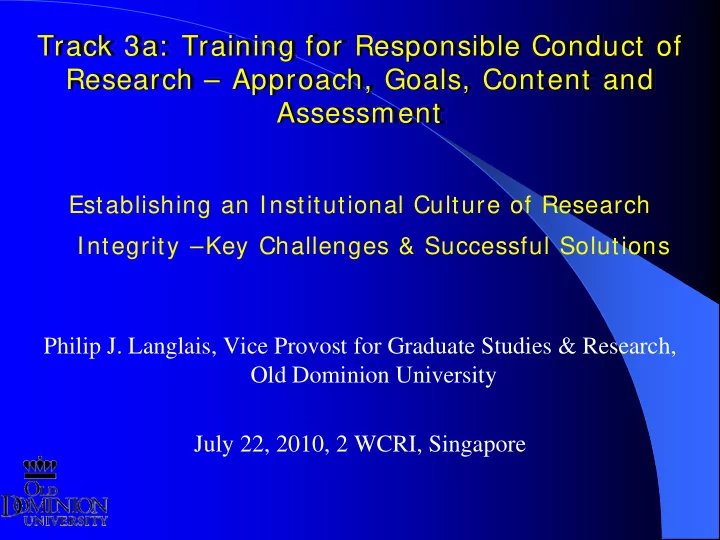

Track 3a: Training for Responsible Conduct of Research – Approach, Goals, Content and Assessment Establishing an Institutional Culture of Research Integrity –Key Challenges & Successful Solutions Philip J. Langlais, Vice Provost for Graduate Studies & Research, Old Dominion University July 22, 2010, 2 WCRI, Singapore
Challenges Facing Higher Education Department, College and University Culture
Challenges to Establishing an Institutional Climate for RCR Training Common Attitudes and Perceptions � Faculty already providing appropriate training � Misconduct and misbehaviors “rarely”, if ever, occur � Applies only to biological and medical research � Limited to meeting federal human and animal subjects regulations � Faculty workloads are already excessive � Faculty behaviors are personal and private and “outside interference” violates academic freedom � RCR training requires major changes to curriculum and significant new resources – no room in current curriculum Chron Higher Ed 2004
Critical Initiatives “Top down” and “Bottom up” support are essential � University committee of respected faculty & key administrators that develops assessment and educational plan, delivers training and builds cultural norms � Strong and consistent support of Academic Affairs and Research Officers � University Counsel makes clear the legal, financial and reputational liabilities for allegations of misconduct and questionable research practices � Assess RCR training practices, attitudes and perceived effectiveness – present findings to faculty, students, and administrators
Successful Outcomes � Faculty incorporating RCR topics into existing required courses, e.g., research design and methods, introduction to scientific inquiry, etc., � Departments/school promoting thesis and dissertation agreements on authorship and use of data. � Departments/schools including research integrity and social responsibility/impact questions on comprehensive and advancement to candidacy exams. � University Outstanding Mentor awards. � RCR training has been added to new faculty professional development programs.
Successful Outcomes � Students have exerted pressure on faculty, dept. chairs, university administrators to provide better training. � University Faculty Senate and President approved mandatory RCR education program for all graduate students. � Several departments have voluntarily instituted mandatory RCR/ethics course for undergraduate and graduate students. � Institution has undertaken a major review of its “Whistle-blowing” policy pertaining to protection of credible complaints of misconduct or serious misbehaviors
Recommend
More recommend